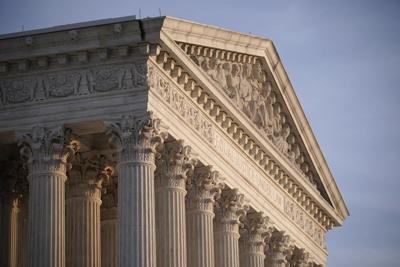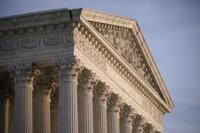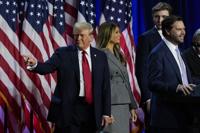WASHINGTON (AP) — The Supreme Court said Monday it will hear a case in which a man tried to trademark a phrase mocking former President Donald Trump as “too small.”
The Justice Department is supporting President Joe Biden’s once and possibly future rival in urging the court to deny a trademark for the suggestive phrase “Trump too small” that a California man wants to put on T-shirts.
The case will be argued in the fall, one of two disputes on the court’s upcoming agenda that involve Trump or one of his businesses. Government officials said the phrase “Trump too small” could still be used, just not trademarked because Trump had not consented to its use. But a federal appeals court said refusing trademark registration violated free speech rights.
The high court has considered a raft of Trump-related cases in recent years. The justices have dealt with and with his efforts to and to keep other tax , among other things.
If the justices are tired of Trump-related cases, however, they aren’t letting on. Just last month, the high court agreed to hear a different Trump-related lawsuit stemming from disputes over what was the . Democratic members of the House Oversight Committee sued over the Trump administration’s refusal to turn over information about the Trump Organization’s lease of the hotel.
The latest case is unusual in that it has the Biden administration on Trump's side. The administration is defending government officials' decision to reject the trademark request from Steve Elster, who tried to register the “Trump too small” phrase.
The phrase is a reference to a memorable exchange Trump had during the 2016 presidential campaign with Florida senator and GOP presidential rival Marco Rubio.
Rubio began the verbal jousting when he told supporters at a rally that Trump was always calling him “little Marco" but that Trump — who says he is 6-feet-3-inches tall — has disproportionately small hands. “Have you seen his hands? ... And you know what they say about men with small hands,” Rubio said. “You can't trust them.”
Trump then brought up the comment at a televised debate on March 3, 2016.
“Look at those hands. Are they small hands? And he referred to my hands — if they’re small, something else must be small. I guarantee you there’s no problem. I guarantee you," he said.
Federal law says that a trademark request should be refused if it involves a name, portrait or signature “identifying a particular living individual” unless the person has given “written consent.” But Elster says refusing to register a political slogan criticizing Trump without Trump's consent violates the First Amendment's Free Speech clause. Federal law, Elster's lawyers say, “makes it virtually impossible to register a mark that expresses an opinion about a public figure.”
“We look forward to defending the right to convey core political messages on trademarks," Elster's lawyer Jon Taylor wrote in an email. "The government’s attempt to burden political speech — by granting public figures a monopoly over speech about them in the marketplace — is indefensible.”








































